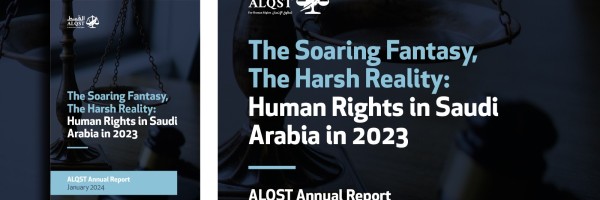The Saudi people and human rights supporters everywhere are looking for radical changes regarding human rights in Saudi Arabia. The country’s change of leadership presents a golden opportunity to make serious reforms, meet some of the public’s aspirations, and relieve them of some of their suffering. Such reforms could allow them to forge ahead in making progress and developing their country, after decades in which a single voice has dominated and everyone else has been denied the freedom to express opinions or participate in civil society and public life. Harsh regulations have proliferated, and baseless restrictions have been placed on the women’s freedom of action, while torturers go unpunished. There have been an increasing number of complaints from members of the public of direct abuses as well as their side effects, which also threaten society in the absence of civil society institutions and freedom of expression. Sectarianism, intolerance and extremism have spread, and poverty, unemployment and crime have all increased, as has corruption and the impunity enjoyed by the corrupt in the absence of civic oversight. All of these things have grown year by year in a climate of oppression that has allowed them to occur, with all their social, cultural and religious implications.
And now a new era has arrived, with a change of personnal at the top of the regime and the dismissal of the former Minister of Interior, who was responsible for numerous violations. And so Saudi society and human rights supporters around the world are looking forward to seeing sincere and bold solutions bring about political change that has a positive impact on individuals, rather than the opposite.
To encourage the new Saudi authorities to take serious steps toward reform, and to make their peace with the ordinary, long-suffering Saudis who deserve to see an end to their sufferings and to enjoy their rights at last, ALQST would like to suggest a number of urgent steps that need to be taken to save the country and prevent things getting any worse, before the situation gets completely out of hand — as it surely will if oppression increases any further and the authorities continue to deny people’s legitimate rights and demands. ALQST therefore calls on the Saudi authorities to prove its good intentions by starting at once to take the following measures. It also calls on members of the public to hold fast to their rights and not allow themselves to be cowed into submission, or be driven to unlawful acts out of despair or frustration with the authorities. And it calls on all those who believe in human rights to promote and advocate these measures. We note that the security and stability of Saudi Arabia has a positive effect on the whole region and the world, while a continuation of repression, tyranny and Saudi policies that create crises will have dire consequences. ALQST therefore urges that the Saudi authorities take the following measures:
- Immediately and unconditionally release detained human rights activists, quash the charges brought against them for their legitimate human rights activities, compensate them for damages, and allow them to carry out their legitimate work.
- Immediately and unconditionally release all journalists, politicians and others held as prisoners of conscience, quash the charges brought against all those who have been persecuted for expressing their opinions, compensate them for damages, and allow them the freedom to express their opinions.
- Immediately release detainees whose sentences have expired, and compensate them for damages resulting from their remaining in prison beyond the term laid down.
- Ensure swift and fair trials for all those in detention who have not yet been tried, immediately release any detainee being held without charge, and comply with human rights standards in all matters of arrest, custody, investigation, trial, and time served in prison.
- Quash all death sentences against minors, and re-try them in accordance with the standards for fair trials, taking into account their ages at the time of committing the offence.
- Quash all ta’ziri (discretionary) death sentences, and end the practice of giving judges powers beyond those prescribed in law and allowing them discretion to apply the death penalty.
- Re-try all those sentenced as a result of unfair trials, ensure that lawyers and translators are available for those who need them during the trial, and ensure that trials are held openly and meet the standards for fair trials.
- End all torture. Comply with the Saudi authorities’ obligations under the UN Convention Against Torture, to ensure that no statements extracted under torture are accepted, all trials that rely on statements extracted under torture are re-heard, those who commit torture do not go unpunished, and all those who suffer any form of torture are granted compensation.
- See to it that conditions in Saudi prisons are improved and that prisoners obtain their basic rights, are not subjected to torture and oppression, and are not exposed to danger in prison by negligence of the authorities, whether because of the presence of drugs gangs or the prevalence of infectious diseases.
- Ensure the independence of the judiciary, and that it does not come under political control. Ensure that justice is codified in law, and that there are clear and specific laws that regulate the courts and do not allow judges to exceed bounds and impose penalties out of proportion to the crime, or that vary from court to court or from judge to judge without reference to a fixed legal tariff.
- Abolish the Specialised Criminal Court, and ensure that all courts are fully independent and not subject to the political authorities in any way.
- Remove all restrictions on freedom of expression and freedom of assembly, and stop intimidating and members of society for their opinions and ideas, or for criticising the authorities and their transgressions. Allow civil society institutions the freedom to form in order to monitor the performance of government agencies and ensure that they act with integrity for the good of society rather than preying on society for the good of certain groups.
- Review the Penal Law for Crimes of Terrorism and its Financing, the Anti-Cyber Crime Law, the Press and Publications Law and other regulations relating to freedom of expression. Ensure that all laws and regulations are compatible with human rights, and ensure there is no confusion between freedom of expression and terrorism. Ensure that the definition of terrorism does not extend to include peaceful opposition or peaceful civic activism, and that countering terrorism is not used as an excuse to suppress liberties.
- Review the way the authorities’ attitudes are reflected in their educational curricula and media policy. Ensure that these do not legitimise attacks on others, or promote a culture of intolerance and violence, or glorify the use of force to effect change, as in the history of the establishment of the first, second and third Saudi states, which came about through tribal fighting, killing and plundering. Ensure, too, that government conduct does not sow divisions between different groups in the community, and cannot be used as a pretext for conflict, violence and terrorism.
- Pass legislation that outlaws incitement against others and makes slander and defamation crimes, and ensures that freedom of expression, as a personal right, cannot be used to infringe or detract from the rights of others; and enforce the provisions of the International Convention on the Elimination of All Forms of Racial Discrimination.
- Remove the restrictions on women that prevent them from driving their cars, prevent them from going about their daily lives without restrictions imposed by male guardians, and prevent them from taking an active part in society. Ensure that women are able to take an active part in society and that laws and regulations protect women from domestic violence, oppression and marginalisation, and ensure compliance with the Convention on the Elimination of All Forms of Discrimination against Women.
- Introduce a law to ban harassment and protect vulnerable groups from being harassed and exploited.
- Ensure the prompt and urgent resolution of the issue of stateless persons, including the bidoon, members of nomadic tribes, the mawaleed, and the children of Saudis without citizenship, and see that the Saudi Residence Regulations and Saudi Citizenship System are amended and updated. Promptly sign up to the Convention Relating to the Status of Refugees and regularise the status of all those resident on Saudi territory, ensuring that they are granted all of their basic rights and do not remain without rights and without any national identity, suffering difficulties in every area of their lives.
- Ensure implementation of the rights of children, and that the authorities support the protection of children’s rights. Ensure that children are protected, receive immunisations and are looked after, and enforce the provisions of the Convention on the Rights of the Child.
- Ensure implementation of the rights of disabled persons, and that the authorities support the protection of disabled people’s rights. See that people with disabilities have the necessary support, and ensure adherence to the provisions of the Convention on the Rights of Persons with Disabilities.
- Begin to take serious steps toward allowing members of Saudi society to participate politically, elect their representatives and be involved in the running and development of their country. Ensure the Saudi authorities’ ratification of the International Covenant on Civil and Political Rights.
- Stop monopolising wealth and power while totally ignoring Saudi society at large. Allow civil society to monitor the performance of government bodies and scrutinise expenditure. Enable it to hold accountable the corrupt and the allegedly corrupt, and enable it to ensure its rights to work and employ others, its rights to housing and medical treatment, and its rights to combat poverty and unemployment. Ensure Saudi Arabia ratifies the International Covenant on Economic, Social and Cultural Rights.
- Ensure justice, equality and the rule of law. Let no one be immune from punishment, and everyone be subject to the rule of law.
- Introduce the separation of powers, and make a serious start toward transforming Saudi Arabia from a tyrannical absolutist regime into a state of rights and institutions.
- Stop violating human rights abroad, and put an immediate end to the rights violations and crimes being committed in the war in Yemen. Stop putting civilians in danger, and end support for any groups in any part of the world that do not respect human rights and seek to impose their objectives on others by force of arms, as in Syria and elsewhere. Stop subjecting innocent people to collective punishment for political considerations, as in the recent crisis with Qatar. Stop supporting repressive regimes that tyrannise their peoples, as happened with the government of Bahrain and the Sisi government in Egypt. And respect human rights in any Saudi foreign interventions.
ALQST believes that making a start on these measure will be evidence of a sincere intention to make genuine reforms, whereas stalling on any of them will be evidence of a determination to persist in committing abuses and disregarding the rights of Saudi society and regional security. ALQST believes that for Saudi Arabia to persist in its old ways will further increase tension in the region, sending the country hurtling toward the brink of collapse, with dire consequences for both the country and the region.


